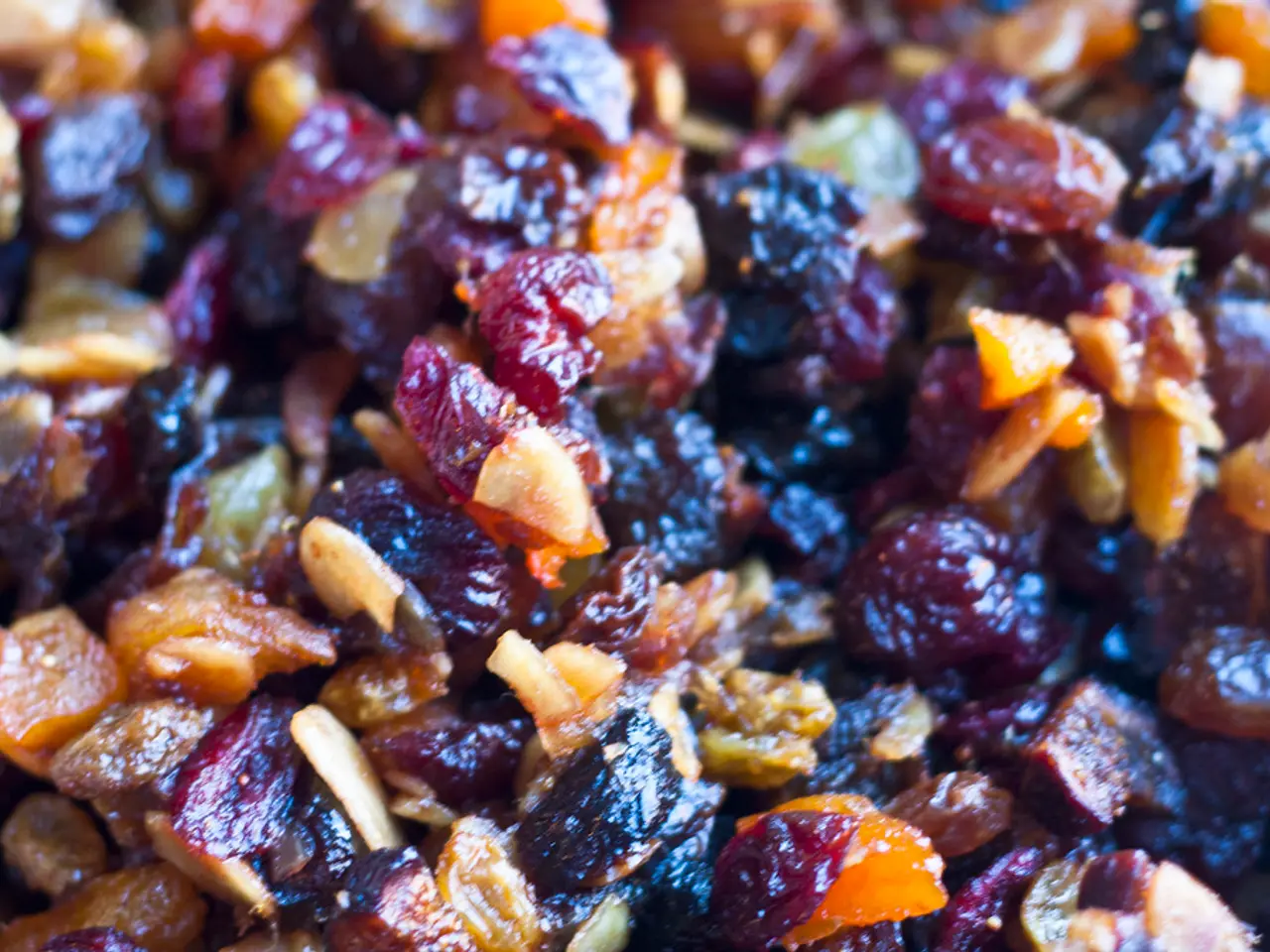Food sources rich in Vitamin B1: Natural and fortified alternatives
Vitamin B1, also known as thiamine, is an essential nutrient that the body cannot produce. This water-soluble vitamin, like all the other B vitamins and vitamin C, plays a crucial role in various bodily functions. The body stores vitamin B1 in small amounts in the liver and requires a continuous supply from food or supplements.
In the United States, the Recommended Dietary Allowance (RDA) of vitamin B1 for adults aged 19 years and up is 1.1 mg for females and 1.2 mg for males. However, during pregnancy and breastfeeding, the RDA increases to 1.4 mg.
Foods rich in both vitamin B1 and other B vitamins include whole grains, legumes, nuts and seeds, lean meats, fish, eggs, and dairy products. These foods supply multiple B vitamins that contribute to essential bodily functions such as energy production, nervous system health, brain function, and red blood cell formation.
Key Food Sources of B1 and Broad B-Vitamin Content
- Whole grains (brown rice, whole wheat bread, oats): High in thiamine (B1), riboflavin (B2), niacin (B3), and folate (B9).
- Legumes (black beans, lentils, peas, soybeans): Provide thiamine, riboflavin, niacin, and folate.
- Nuts and seeds (sunflower seeds, flaxseeds, almonds, pistachios): Contain thiamine, riboflavin, niacin, and biotin (B7).
- Lean meats (especially pork, beef liver): Rich in thiamine, B6, B12, niacin, and pantothenic acid (B5).
- Fish (salmon, tuna): Supply thiamine, vitamin B6, B12, and biotin.
- Eggs and dairy products (milk, cheese): Good sources of riboflavin (B2), B12, and biotin, with some thiamine content.
- Vegetables (spinach, potatoes, asparagus, sweet potatoes): Provide various B vitamins, notably folate, B6, and small amounts of thiamine.
Nutritional Benefits from these B vitamins include:
- Vitamin B1 (Thiamine): Converts carbohydrates into energy, supports nerve function, brain health, and heart regulation.
- Vitamin B2 (Riboflavin): Aids energy metabolism, antioxidant protection, red blood cell formation.
- Vitamin B3 (Niacin): Supports skin health, digestion, and nervous system functioning.
- Vitamin B5 (Pantothenic Acid): Essential for synthesizing coenzyme A, involved in fatty acid metabolism.
- Vitamin B6 (Pyridoxine): Important for amino acid metabolism, neurotransmitter synthesis, and immune function.
- Vitamin B7 (Biotin): Helps with fatty acid synthesis and energy production.
- Vitamin B9 (Folate): Key for DNA synthesis, red blood cell production, and fetal development.
- Vitamin B12 (Cobalamin): Necessary for neurological function and red blood cell formation; found only in animal products.
Including these foods in a balanced diet ensures adequate intake of vitamin B1 and the other B vitamins, supporting energy metabolism, nervous system health, and overall vitality. Cooking methods such as steaming or stir-frying help retain water-soluble B vitamins better than boiling.
Some examples of B1-rich foods and their B vitamin content per 100-gram serving are:
- Pork: 0.6 mg of vitamin B1
- Canned black beans: 0.1 mg of vitamin B1
- Cooked green peas: 0.2 mg of vitamin B1
- Every 100 g of sunflower seeds: 0.6 mg of vitamin B1
- A 100-g serving of cooked wild Atlantic salmon: 0.3 mg of vitamin B1
- Sunflower seeds: A range of other nutrients including vitamins B2, B3, B6, C, E, and K; folate; beta carotene; and minerals such as calcium, iron, magnesium, phosphorus, potassium, sodium, zinc, copper, and selenium.
- Salmon: Also a source of all the B vitamins, vitamin A, essential fatty acids, and a range of essential minerals.
- Pecans: 0.3 mg of vitamin B1, in addition to vitamins B2, B3, B6, C, E, and K; folate; and beta carotene.
By incorporating these nutrient-dense foods into your diet, you can ensure a balanced intake of essential vitamins B1 and other B vitamins, promoting energy metabolism, nervous system health, and overall vitality.
- Incorporating magnesium-rich foods like sunflower seeds into your diet can complement the B vitamins they also provide, contributing to essential bodily functions such as energy production and nerve function.
- The health-and-wellness benefits of nutrients like zinc and vitamins, such as B12 found in salmon, are diverse, including neurological function support, red blood cell formation, and immune system enhancement.
- By pairing foods like eggs and dairy products, which are rich in B2, and dark leafy greens, a good source of B9 (folate), you can enhance the absorption of these B vitamins and support DNA synthesis and red blood cell production.




